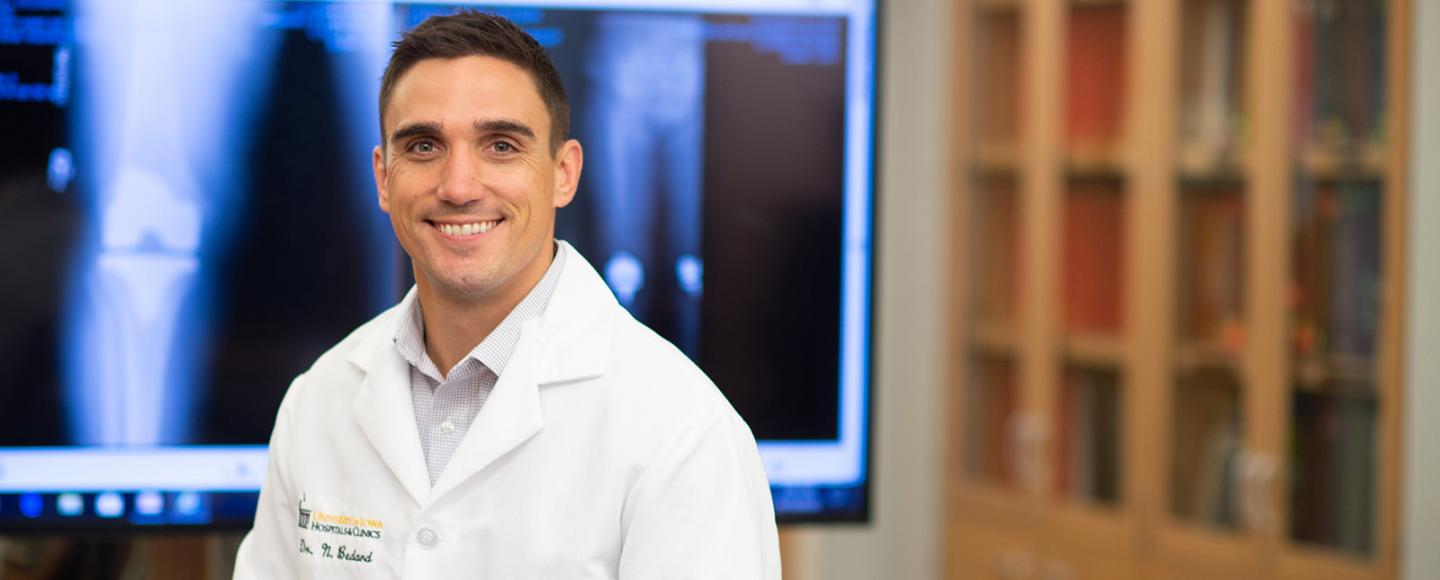Table of ContentsClose

Bedard: Mining data to reduce post-surgery complications
For the past decade, Nicholas Bedard (13MD, 18R) has studied vast batches of data to identify risk factors for post-surgical complications following knee or hip replacement. Among his published research findings, he reported that a high body mass index and/or active tobacco or preoperative opioid use can seriously impact patient outcomes following surgery.
Now, Bedard, assistant professor of orthopedics and rehabilitation, is working on his most extensive study yet: a prospective, multicenter evaluation of the use of prophylactic oral antibiotics among knee and hip replacement patients with a high risk of postoperative infection. The study is supported by a grant from the American Association of Hip and Knee Surgeons, and Bedard is currently recruiting patients. He and his research colleagues plan to enroll approximately 5,000 patients from across the U.S.
“This is my first time running a multicenter study with other major academic medical centers. So far, our recruitment activities are going well, even with COVID-19,” says Bedard. “We’re swinging for the fences with this one. It’s an exciting time.”

A previous retrospective study by researchers at Indiana University on a smaller sampling of patients found that knee and hip replacement patients with a high risk of postoperative infection were less likely to develop an infection in the 90 days after surgery when they received seven days of oral antibiotics. Bedard says his study could support those findings or show that the seven-day antibiotic regime is unnecessary.
“The current standard of care is antibiotics for 24 hours post-surgery,” he says. “In our study, some patients will get standard care, and some will get the seven days of antibiotics. We’ll follow both sets of patients for the first year post-surgery and record what happens. We’d like to be able to identify if the seven days of antibiotics is excessive or if it does help prevent infection in high-risk patients.”
Bedard and his team will be evaluating post-surgery infections, which are almost impossible to cure without secondary surgery, as well as side effects from antibiotics, which can include nausea, rashes, and allergic reactions.
As a result of past studies, Bedard has learned that there’s more than one reason a knee or hip replacement can become infected. He’s looked at the effects of smoking, and even past smoking, and found tobacco use to be a significant risk factor for infection. Bedard says that smoking affects blood flow to soft tissue in the body, and that if blood flow is inadequate following surgery, wounds are slower to heal, and an infection can take hold.
“Infections around foreign bodies are very difficult to eradicate,” says Bedard. “The bacteria from the infection sticks to the implant and creates a biofilm. These biofilms are resistant to antibiotics—they set up a shield that the body can’t adequately fight. So, we almost always have to remove the implant.”
Opioid use before surgery can also cause problems, and Bedard encourages patients to reduce opioid use before their surgery date.
“With opioids, in particular, if the patient stops taking them before surgery, it’s easier to control their pain post-surgery, and the data supports that they have better outcomes,” says Bedard.
Identifying and modifying risk factors before and after surgery are what drives Bedard’s research.
“I hope that with our research we are able to identify ways to more safely perform hip and knee arthroplasty in patents who are at high risk for complications following surgery,” says Bedard. “This will help them to truly benefit from these life-changing procedures.”
